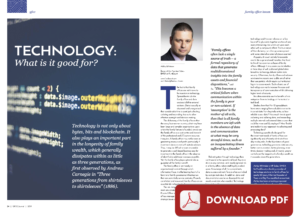 The fact is that family offices are not known to be investors in technology. Spreadsheets rule the family office and data analysis is left to external advisors. Data is usually so dispersed and unorganised that considerable time is spent just collecting, collating and reconciling it so as to allow effective oversight and decision-making.
The fact is that family offices are not known to be investors in technology. Spreadsheets rule the family office and data analysis is left to external advisors. Data is usually so dispersed and unorganised that considerable time is spent just collecting, collating and reconciling it so as to allow effective oversight and decision-making.
The dichotomy of the family office is that the savvy businessmen running what may have been large and complex organisations upon which the family fortune is founded, simply see the family office as a cost centre and starve it of the professional and (IT) system resources it requires. A family office may not be seen as generating revenue and profit, particularly if investment decisions rest with outside advisors. Thus, it may be difficult or even impossible to generate a cash-based business case for investment in the family office in the absence of identifiable additional revenues or profits. Yet, the family office plays a pivotal role as guardian of the family’s wealth.
The family office is not merely an organisational conduit through which information flows, it is the beating heart of a functional family governance infrastructure that can potentially survive centuries. Properly constituted and resourced, family offices are an essential risk mitigation tool.
The risk mitigation that technology brings starts at a strategic level. Andra Ilie of Knox Private Office is often called in to help family offices manage such essential but neglected strategic issues as succession planning.
“Family offices often lack a single source of truth — a formal repository of data that generates multidimensional insights into the family assets and financial dispositions,” said Ilie. “This becomes a critical failure when communication within the family is poor or non-existent. If ‘assumption’ is the mother of all evils, then that is all family members are left with in the absence of data and communication at what may be very stressful times, such as an incapacitating illness suffered by a founder.”
Risk mitigation through technology then continues in to the operational level. Key man risk is a very common, and readily ignored risk in a family office, where staff loyalty is relied upon. Knowledge of all the spreadsheets, data sources and work flows is often controlled by a single individual. In addition, data and documentation can be so dispersed it is not readily available when needed. Technology brings internal transparency.
Alex Ivanov, CEO of FundCount, an accounting and investment management software company, notes, “Family offices are often highly leveraged with respect to governance risk. The lack of investment in technology and the over-reliance on a few key staff to glue data together are two of very many interlocking risks which act upon each other with a compound effect. The true nature of the risks being run often go unrecognised until some internal or external stress is exerted.”
Arguably, it is such entirely foreseeable events like a generational transition that lead to the all too common collapse of family offices. Although it may seem counterintuitive in these days of well publicised global data breaches, technology delivers better data security. Oftentimes, family offices and advisors send sensitive reports over public email rather than use portals, which require authenticated log in to access reports. Such a basic use of technology can vastly increase the ease and transparency of communication whilst delivering higher levels of security.
It is often easiest to see the benefits of risk mitigation from technology at the tactical or task level. Studies show that 9 in 10 spreadsheets have errors ranging from calculation errors to incorrect data from keystroke entry, so how reliable is your data? How much time is spent collecting and collating data, and reconciling multiple internal and external data sources that could be more usefully deployed? How flexible and resilient is your approach to collecting and processing data?
Technology specifically designed for the investment needs of family offices can significantly and efficiently eliminate these day-to-day risks. As the foundation of good governance, technology promotes data security, better communication, better planning, more timely decision making and ultimately, greater control over the longevity of a family’s wealth as it cascades down the generations.
Ashley Whittaker is VP Sales, EMEA for FundCount, a leading provider of technology solutions to family offices for nearly 20 years. A former Inspector of Taxes and Big Four qualified accountant, Ashley has been a leading proponent of financial software for over 20 years, founding the UK’s first B2B SaaS software company in the 1990s and joining FundCount in 2018 to establish the London office.
Published in GFOC Journal





